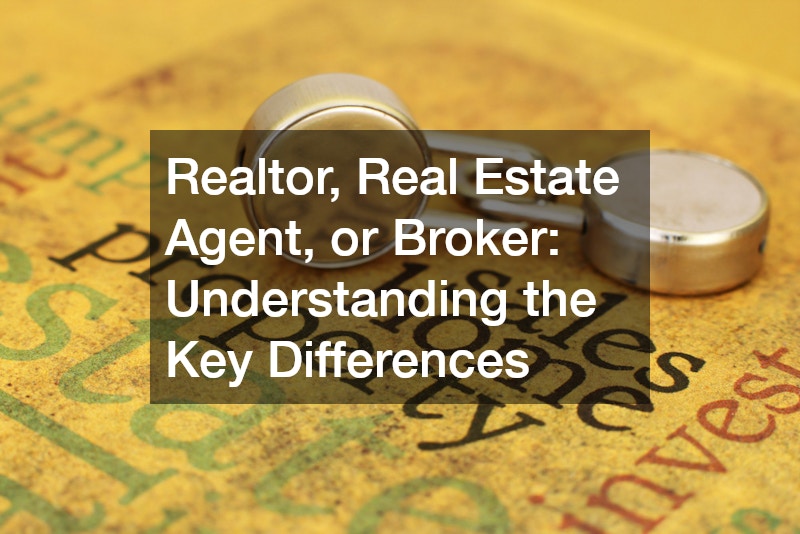
The real estate industry has its own set of terms that are often used interchangeably but have distinct meanings. Three commonly confused titles are Realtor, real estate agent, and real estate broker. Each role comes with specific qualifications, responsibilities, and implications for how they conduct business.
Understanding these differences can help you better navigate real estate transactions, whether you’re buying, selling, or pursuing a career in the field.
What is a Realtor?
A Realtor is a real estate professional who is an active member of the National Association of Realtors (NAR). While the term is often used as a synonym for real estate agent, not all agents are Realtors. Becoming a member of the NAR is voluntary but provides significant benefits, including access to the Multiple Listing Service (MLS), a critical database of properties on the market or recently sold.
To become a Realtor, an individual must:
- Hold a valid real estate license.
- Pay annual membership dues to the NAR.
- Uphold the NAR’s standards of professionalism and ethics.
- Complete ongoing education to stay current on industry practices.
Realtors adhere to a strict code of ethics that sets them apart from other real estate professionals. This commitment ensures higher standards of practice, making Realtors trusted advocates for their clients.
In the realm of commercial real estate, the role of a Realtor is less common because many transactions occur off-market or through alternative databases like CoStar. However, for residential transactions, being a Realtor can provide valuable resources and tools to clients.
Real Estate Agent vs. Real Estate Broker
The terms real estate agent and real estate broker are often used interchangeably, but their distinctions lie in licensing and responsibilities. Depending on the state, the real estate licensing system may operate under a two-tier or single-tier structure.
Two-Tier Licensing System
In states with a two-tier system, there are two primary designations:
-
Real Estate Salesperson (Agent):
- A real estate agent is a professional who has completed the basic licensing requirements to help clients buy, sell, or rent properties.
- Agents typically work under the supervision of a licensed broker, who oversees their activities and ensures they comply with legal and ethical standards.
- To conduct business, agents must “hang” their licenses with a broker and share a portion of their commissions.
-
Real Estate Broker:
- Brokers have completed advanced licensing requirements, including additional exams and at least two years of experience as a salesperson.
- A broker can operate independently or manage a team of agents.
- Brokers often run their own firms and provide resources, training, and support to agents under their supervision.
This system ensures that brokers, with their additional experience and qualifications, can guide agents and help them navigate the complexities of real estate transactions.
Single-Tier Licensing System
In single-tier states, there is only one standardized license: the broker’s license. Everyone in the real estate profession holds this license. However, roles are differentiated based on experience and additional certifications:
- Broker (Agent): A licensed professional who may still operate under the supervision of a more experienced broker.
- Managing Broker: A broker with additional certifications and experience, typically responsible for overseeing other brokers or agents.
Despite the differences in licensing systems, the general principle remains the same: less experienced professionals focus on sales, while more experienced ones take on managerial or supervisory roles.
Key Differences Between Agents and Brokers
The easiest way to remember the difference is to think of a real estate agent as someone primarily focused on buying and selling properties for clients, while a broker often manages a real estate firm or oversees the activities of agents. Brokers tend to have more responsibilities and earn a higher percentage of commissions due to their expertise and leadership roles.
Commercial Real Estate Exception
In commercial real estate, the terminology can be slightly different. Most professionals are referred to as brokers, regardless of whether they hold a salesperson’s license or a broker’s license. To differentiate, the terms broker and managing broker are commonly used. This reflects the unique nature of commercial transactions, which often involve off-market deals and relationships built over time.
Why These Distinctions Matter
Understanding the differences between Realtors, real estate agents, and brokers is important for several reasons:
- For Clients: Knowing whom to approach based on your needs can streamline the buying or selling process. Realtors, for instance, bring additional resources and ethical commitments to the table.
- For Professionals: Aspiring real estate professionals can plan their careers more effectively by understanding the qualifications and opportunities available at each level.
- For Industry Clarity: These distinctions help maintain professionalism and accountability within the real estate sector.
Choosing the Right Professional for Your Needs
When selecting a real estate professional, consider their experience, certifications, and memberships. If you prioritize ethical standards and access to the MLS, working with a Realtor may be the best choice. For complex transactions or managerial expertise, a broker might be more suitable.
Conclusion
The terms Realtor, real estate agent, and broker each signify different roles and qualifications within the real estate industry. While Realtors are members of the NAR committed to a higher ethical standard, real estate agents and brokers vary based on licensing and experience. Understanding these distinctions can help clients make informed decisions and professionals navigate their career paths more effectively.
Whether you’re buying, selling, or pursuing a career in real estate, knowing the unique contributions of each role will set you up for success in this dynamic industry.
.





